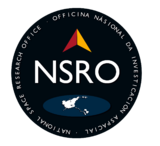National Space Research Office (Carloso): Difference between revisions
(Created page with "{{Region icon MusgorociaSC}} {{wip}} {{Infobox government agency |name = National Space Research Office |native_name = Officina Násional da Investicación Aspacial |agency...") |
No edit summary |
||
| Line 31: | Line 31: | ||
|embed = | |embed = | ||
}} | }} | ||
The '''National Space Research Office''' ('''NSRO'''; ''Officina Násional da Investicación Aspacial'') is the agency of the Department of Science & Research responsible for the operation of the civilian space programme of [[Carloso]]. Its projects range widely from observations and measurements of the planet Earth, operation of space stations in low-Earth orbit, exploration of the Solar System with probes, to operating the Carlosian Lunar and future Martian manned missions. The NSRO was founded in 1959 under then President Samuel Dengra, with the stated aim of matching the capabilities of countries internationally that had already established their own space programmes. In 1962 the agency succeeded in launching its first satellite into space, followed in 1968 by a satellite which orbited the Moon. In the 1970s, as competition with Bourgougia and Barssois over space exploration began to intensify, NSRO began its manned Lunar programme, putting three men on the Moon in 1976. After several more manned Lunar missions, the programme was eventually wound down as public interest | The '''National Space Research Office''' ('''NSRO'''; ''Officina Násional da Investicación Aspacial'') is the agency of the Department of Science & Research responsible for the operation of the civilian space programme of [[Carloso]]. Its projects range widely from observations and measurements of the planet Earth, operation of space stations in low-Earth orbit, exploration of the Solar System with probes, to operating the Carlosian Lunar and future Martian manned missions. The NSRO was founded in 1959 under then President Samuel Dengra, with the stated aim of matching the capabilities of countries internationally that had already established their own space programmes. In 1962 the agency succeeded in launching its first satellite into space, followed in 1968 by a satellite which orbited the Moon. In the 1970s, as competition with Bourgougia and Barssois over space exploration began to intensify, NSRO began its manned Lunar programme, putting three men on the Moon in 1976. After several more manned Lunar missions, the programme was eventually wound down as public interest subsided and more effort was put into exploring the rest of the Solar System. Since then, NSRO has sent many probes and landers to survey and explore objects in the Solar System. | ||
[[Category:Carloso]] | [[Category:Carloso]] | ||
[[Category:Organizations]] | [[Category:Organizations]] | ||
Revision as of 19:36, 7 June 2020
This article is incomplete because it is pending further input from participants, or it is a work-in-progress by one author. Please comment on this article's talk page to share your input, comments and questions. Note: To contribute to this article, you may need to seek help from the author(s) of this page. |
| Officina Násional da Investicación Aspacial | |
 Logo | |
| Agency overview | |
|---|---|
| Formed | 14 July 1959 |
| Type | Space agency |
| Jurisdiction | Carloso |
| Headquarters | Madrigal |
| Motto | "Through hardships to the stars" "Ad astra per aspera" (Latin) |
| Employees | 19,258 |
| Annual budget | D£14.488 billion ($30.184 billion) |
| Agency executive |
|
The National Space Research Office (NSRO; Officina Násional da Investicación Aspacial) is the agency of the Department of Science & Research responsible for the operation of the civilian space programme of Carloso. Its projects range widely from observations and measurements of the planet Earth, operation of space stations in low-Earth orbit, exploration of the Solar System with probes, to operating the Carlosian Lunar and future Martian manned missions. The NSRO was founded in 1959 under then President Samuel Dengra, with the stated aim of matching the capabilities of countries internationally that had already established their own space programmes. In 1962 the agency succeeded in launching its first satellite into space, followed in 1968 by a satellite which orbited the Moon. In the 1970s, as competition with Bourgougia and Barssois over space exploration began to intensify, NSRO began its manned Lunar programme, putting three men on the Moon in 1976. After several more manned Lunar missions, the programme was eventually wound down as public interest subsided and more effort was put into exploring the rest of the Solar System. Since then, NSRO has sent many probes and landers to survey and explore objects in the Solar System.